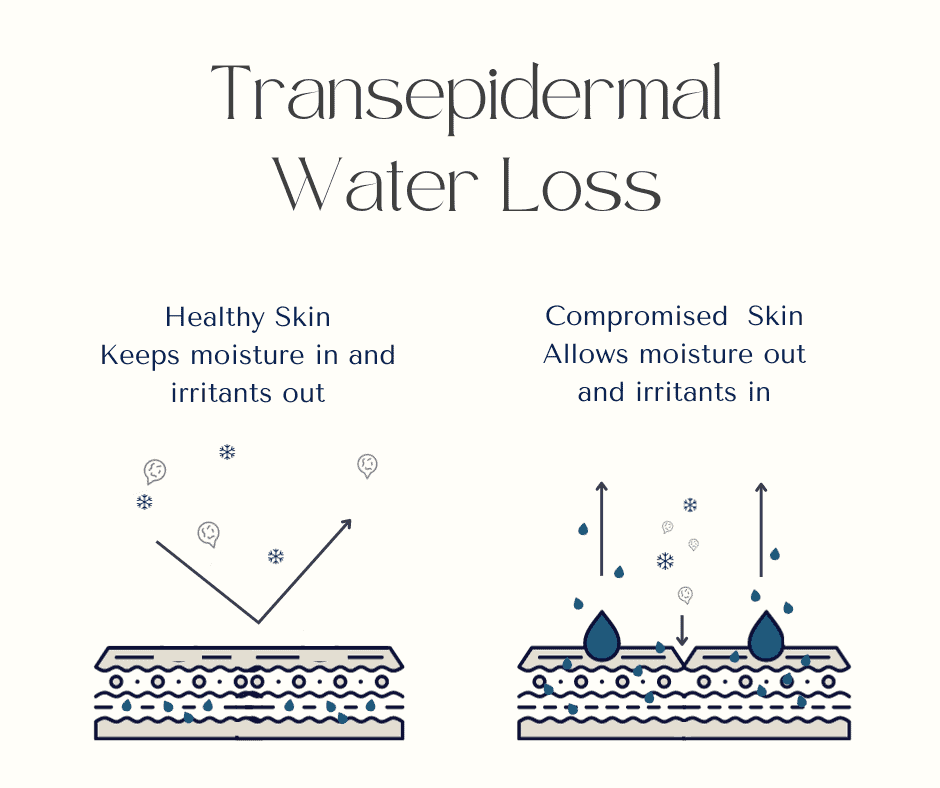
For most of us we are aware that dry and dehydrated skin signifies the skin is lacking moisture and hydration, but have you ever heard the term Transepidermal Water Loss?
Whilst it might sound a little sciencey and all too technical, it’s actually a process that is constantly happening to each and every one of us. But there are a few factors that can aggravate it resulting in some not so nice symptoms. The good news is knowledge is power – and knowing what to do to avoid these flare ups, as well as the kind of products to protect your skin, can put a stop to those symptoms altogether.
What Is Transepidermal Water Loss?
The term transepidermal water loss refers to the natural and unavoidable process of water evaporating through the epidermis (outer layer of the skin) into the air. Whilst it happens all throughout the day, the process of water loss in the skin accelerates significantly throughout the night. In fact, it has been found that on average we lose between 300ml-400ml of water from the skin each day, most of which occurs as we sleep. In healthy skin, the level of water loss will be in proportion with the skin’s hydration, contributing to the maintenance of a healthy skin barrier. But when the rate of water loss is faster than the skin is able to rehydrate is when the symptoms will begin to appear.
Causes and Symptoms
There are a few factors which can exacerbate excessive epidermal water loss. Extreme temperatures, both very hot or very cold air can significantly increase the amount of water loss our skin undergoes, which is why in the colder months our skin is particularly vulnerable when the outside cold harsh air is then met with the indoor heating. Other factors which can be particularly damaging to the skin and can increase the likelihood of experiencing transepidermal water loss is air pollution, smoking and increased exposure to ultraviolet radiation. A trigger that can often be overlooked, despite being proven to significantly increase transepidermal water loss is stress. This is because cortisol (the stress hormone) can impact hyaluronic acid balance in the skin, as well as the skins lipid production, resulting in a damaged skin barrier, therefore increasing water loss. One skincare crime we might all be guilty of committing at some point in the name of clear skin is over washing and over exfoliating the skin. Whilst our intentions might be good, the results aren’t quite the same. Instead we can find ourselves suffering the symptoms of transepidermal water loss to it’s very core, particularly when the products we are using are overly harsh. Recognising the way in which transepidermal waterloss manifests is crucial to being able to heal and refine the skins health, tone and texture. The most common symptoms associated with TEWL are flaking skin, dryness, itchiness as well as a tight feeling on the surface of the skin. You may also find that as well as a rough texture, fine lines and wrinkles are suddenly more visible as a result of the dehydration. But the good news is that there are steps we can take to treat and prevent the impact TEWL can have on the skin.
Simple Steps To Prevent Transepidermal Waterloss
1. For those living in an environment where there is low humidity (so there is mostly dry air, as often is the case during the colder months) having a humidifier at home can have a significant impact. This is because a humidifier will increase the amount of moisture in the air, allowing the skin to more easily maintain its hydration balance.
2. Avoid harsh cleansers – whilst it may seem like a harsh cleanser is able to give you that overly clean feeling, the reality is it is stripping away much more than you want it too. By stripping away at the skins very crucial moisture and hydration barrier, you are left with dry, irritated and compromised skin. Luckily finding a gentle yet effective cleanser that helps maintain the skins ph levels is a lot easier to come by than it once was. A perfect example is the Vemel No.1 Cleansing Oil which contains a blend of natural plant oils and extracts to purify the skin whilst still keeping the skin barrier intact.
3. Include nourishing and hydrating products in your daily routine – an effective moisturiser will not only inject a boost of hydration into the skin, but it will also act as an occlusive layer to prevent hydration from leaving the skin. And the Vemel Vitamin Rich Face Butter fits the bill perfectly. Rich in vitamins, fatty acids and antioxidants, it can not only offer the skin a hit of hydration but is designed to provide long-lasting nourishment to improve the overall health of the skin.
4. To give your skin the best chance at maintaining a healthier barrier, avoid smoking and alcohol, which have been proven to cause inflammation in the skin, resulting in transepidermal water loss. Which is why you might notice the skin showing more signs of aging when you smoke or drink more often.
Ultimately, whilst transepidermal waterloss is a very natural and inevitable process, putting in place a few daily measures can mean the skin is able to maintain the balance of hydration and look and feel it’s healthiest.